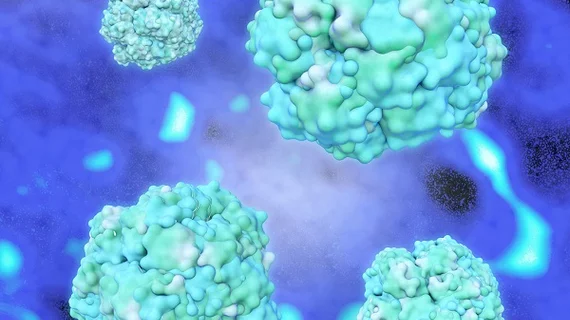New radiohybrid PET imaging agent increases detection of prostate cancer recurrence
Detection of prostate cancer recurrence could see a boost in upstaging with the use of a new radiohybrid PET imaging agent.
That’s according to a presentation that took place last week at the 2022 American Urological Association’s annual meeting that shared updated results from the phase 3 SPOTLIGHT trial, which is testing the efficacy of 18F-rhPSMA-7.3 for the detection of prostate cancer recurrence. The latest data indicate that use of the imaging agent frequently results in disease upstaging.
“The ability to determine the extent and location of recurrent prostate cancer to inform appropriate clinical management is key for physicians and their patients, as up to 40% of patients who undergo radical prostatectomy, and up to 50% of patients who undergo radiation therapy will develop local or distant recurrences within 10 years,” said Mark T. Fleming, MD, Virginia Oncology Associates, US Oncology Research, as a representative of the SPOTLIGHT study group.
The SPOTLIGHT trial is being conducted to test the safety and diagnostic performance of 18F-rhPSMA-7.3 PET imaging agent in men who have elevated PSA levels after completing therapy. For 45% to 47% of patients who were deemed negative after conventional baseline scans (250 out of 366 patients), the use of the radiohybrid imaging agent resulted in at least one true positive PET finding.
In men who had undergone prostatectomy, 3.5-8.0% (7-16/201) of positive scans revealed lesions in the prostate bed region, while 18-21% (36-43/201) were identified in pelvic lymph nodes and 21-26% (43-52/201) in other sites, all of which resulted in upstaging. These numbers were higher in the group of men who had undergone radiotherapy, at 39-41% (18-19/46), 6.5% (3/46) and 20-30% (9-14/46).
The results of the study, which is being conducted by Blue Earth Diagnostics, are being included in a New Drug Application to the U.S. Food and Drug Administration for 18F-rhPSMA-7.3 PET imaging.
“In line with our mission to help patients with cancer, we continue to develop our uniquely comprehensive prostate cancer portfolio,” said David E. Gauden, D.Phil., Chief Executive Officer of Blue Earth Diagnostics. “18F-rhPSMA-7.3 represents a new class of high affinity PSMA-targeted PET radiopharmaceuticals. Early studies of 18F-rhPSMA-7.3 demonstrated high binding affinity for PSMA, together with biodistribution data suggesting the potential for low bladder activity.”
The Journal of Urology abstract can be viewed here.
Related prostate cancer imaging news:
Prostate cancer recurrence scoring system yields 'promising' results
New MRI technique 'lights up' prostate cancer
FDA approves new radioligand therapy for PSMA positive metastatic prostate cancer

